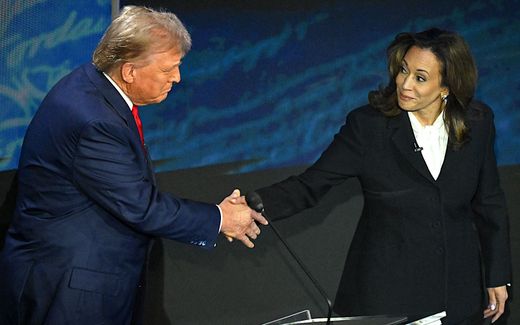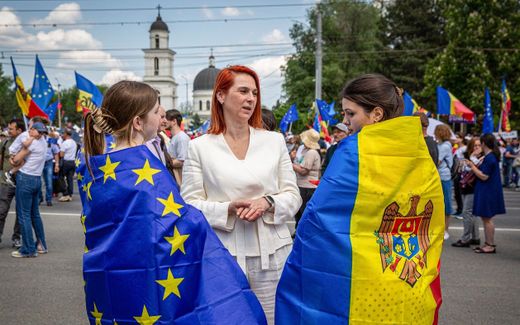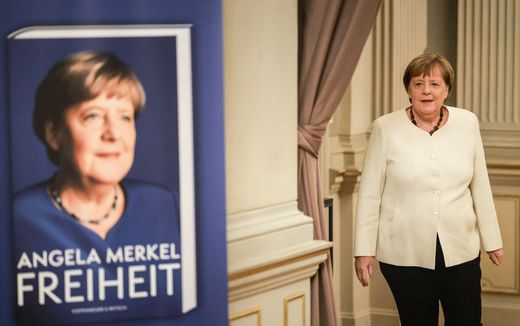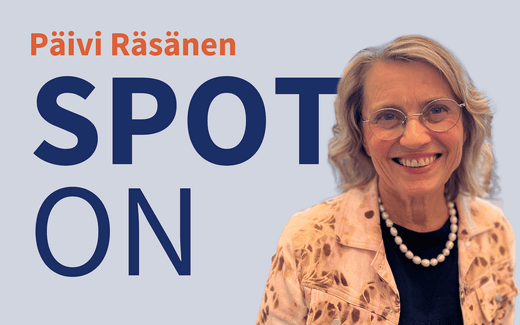Christians are a necessary voice in the wilderness, says Valeriu Ghilețchi

Valeriu Ghiletchi. Photo CNE.news, Canva
Christian Life
Valeriu Ghilețchi grew up in the Soviet Union without religious freedom. He is grateful for religious freedom. He believes the Christian voice is needed in secular Europe.
Stay up to date with Christian news in Europe? Sign up for CNE's newsletter.
Valeriu Ghilețchi is a politician at the European level now and promotes Christian values for the good of society.
Born and raised in Pînzăreni, Moldova, Valeriu Ghilețchi grew up under Soviet occupation. He had the dream of studying theology, but there was no possibility of doing so. However, when the Soviet Union collapsed, he followed his dream and became a Baptist clergyman. Later on, he had a call from God to become a politician. Now, he serves as associate pastor at Jesus the Savior Baptist Church in Chișinău, Moldova, and he is the president of the European Christian Political Party (ECPP).
Tell me about your journey
“I was born in Moldova in 1960, when it was still part of the Soviet Union. My grandfather was the first Baptist pastor in the village where I was born, but there was no religious freedom at the time. It was my dream and desire to study theology. Still, since there was no possibility of doing so, I decided to study radio and telecommunications. I graduated from the university in Odessa.
As soon as the Soviet Union collapsed and a change of regime occurred in Romania, I had the opportunity to attend Emmanuel Bible University in Oradea to study theology. After I graduated, I returned to Moldova and founded the College of Theology here in Chișinău.
“When God opens new doors and you have new challenges, you accept those challenges”
When Moldova gained independence in 1991, I felt a calling from God to become a member of parliament. I decided to run in ’98 and was elected, but I was defeated three years later. Then, the leaders of Baptist churches asked me to become the president, the bishop, of the Baptist Union. I served eight years as bishop. After completing my second term, I felt a renewed calling to return to politics. In 2009, I ran for parliament again and served for over 10 years.
During these years, I was also a member of the Parliamentary Assembly of the Council of Europe (PACE), representing the Republic of Moldova. And while in the PACE, I learned about the European Christian Political Party (ECPM) and became an individual member of ECPM at that time. Later, I decided to run for the presidency and was elected. We changed the name to ECPP, European Christian Political Party.”
How have these experiences changed your worldview?
“I had the Christian worldview from my childhood. I studied the Bible since I was a young man. I joined the Baptist church after moving from my home village and became very active in the youth ministry. When God opens new doors and presents new challenges, you accept them. These experiences I mentioned earlier enriched and enlarged my worldview.
I believe that, even though church and state are separate entities, faith can and should play a role in both. One of my first reports in PACE was about tackling discrimination against Christians in Europe. A key aspect of the resolution is that Christians must be empowered to participate actively in public life.
Your Christian worldview will impact your actions, thinking and decisions. That is why I founded the Academy for Integrity and Leadership in 2025, a non-governmental organisation. I felt like I needed to take the responsibility for young people and motivate and train them so they would become involved in public life.”
How did you combine being a member of parliament in Moldova, being the president of the European Christian political party and being a pastor?
“I am not an MP anymore. I was defeated in 2019, but I served for over 13 years. I am currently an assistant to a member of parliament, so I remain active, albeit in a different capacity. As an MP, I would lead a Bible study during prayer time to help us make informed decisions when serving in public office. And I still do this every Tuesday morning. I believe that is important. So, in this way, I would blend my two functions sometimes.”
About Valeriu Ghilețchi
Valeriu Ghilețchi and his wife Marina have been married for 38 years. They have three children, two sons and a daughter, and they have seven grandchildren. Because of this this, Ghilețchi considers himself a blessed man. His whole family still lives in Moldova. That makes him happy, because many young people immigrate to the west due to difficulties in Moldova. Given the fact that he is a pastor, Valeriu believes the key to raising children in the faith, is practising what you preach.
Given the secularisation in Europe, how can Christian politics still influence Europe?
“Secularisation is a double-edged sword. On the one hand, it is not good for us as Christians, as society loses its faith. Still, on the other hand, it allows us to discuss our Christian values and demonstrate how they differ from mainstream opinions.
There are situations when even secular, liberal media recognise that some of the decisions made in the past were not good for society. After a specific period of time, when you evaluate what was done and its impact on society, you see some very negative consequences. And I think that it is important for us to be there, even though we are seen as a voice in the wilderness. That voice is needed in our secular Europe.
“We believe that secularisation is a great opportunity to emphasise and promote our values for the good of society”
Of course, we regret that Christian Europe became very secular. But on the other hand, we believe that this is an excellent opportunity to emphasise and promote our values for the good of society.”
Recently, you have been re-elected as president of the ECPP. What is your vision for the party?
“My vision is to make ECPP stronger and more vocal in the European political landscape. We are the smallest party in the parliament, but the only openly Christian party. We aim to influence the decisions made at the European level.
We already achieved some growth. ECPP is now larger than it was four years ago, having expanded from four to seven MEPs. And I hope that by the end of my second term, we will be even stronger and larger. But these things are not easy when you are a small party, because of your limited influence.”
How are you planning to do so?
“We encourage Christian politicians to found Christian parties in their own countries. If we find a party in one of the EU countries that shares a similar programme, we discuss with them and invite them to join ECPP. It is an ongoing process. This is how we have been able to grow. We will continue the search to find new Christian politicians who are willing to join us.”
To what extent do you face negative frames and publicity?
“Criticism and attacks are inevitable for politicians and public figures. Even though they are unfounded, they are inherent to this field of work. If I defend the traditional view of marriage as between a man and a woman, I get labelled as homophobic. Which I am not; I never attack people for their convictions or views.
I believe in responding to criticism with wisdom, choosing when to engage and when to ignore based on context. I often avoid unnecessary confrontations. Handling attacks is a test of leadership and values, responding with firmness, kindness, and clarity, avoiding scandals.”
What motivates you in your daily work?
“I am motivated by my faith. Faith brings hope, which is a source of power. It serves as motivation to do things because you believe those things are right.
Sometimes I also get stopped on the street. People who recognise me are glad to see me and tell me they like my political views. People actually watching me during debates and listening to my points also motivate me.”
“If you build your family relationship based on feelings, it will not last long”
What does your faith mean to you?
“The key in my everyday life is a personal relationship with my Lord and Saviour Jesus Christ and living in accordance with the Word of God. This is my guide in my everyday life, including my professional activity as a politician.”
How would you describe your style of leadership?
“I believe in what King Solomon said, counsellors and advisors amplify that wisdom. You need a good team to be a good leader. I consider myself a team player; otherwise, it would be challenging for me. Besides working as a team, you also need perseverance and commitment to your goals.”
What is the secret to a successful, long-lasting marriage?
“My wife and I made it clear from the very beginning that divorce is never a solution to any problems we face. We also realised that love is not just a feeling. If you build your family relationships based on feelings, they will not last long. It must be built upon commitment. If we look at the Bible, love is a command.
Suppose you approach your family life from this perspective. In that case, you can overcome the challenges and difficulties that arise in your relationship. This is also the pastoral advice I give during pre-marital counselling.”
How do you see the future as a Christian in your country?
“I am very thankful to God for the religious freedom we have here in Moldova, especially coming from the Soviet Union, where people were persecuted for their faith.
I do not see a threat to Christians in Moldova at the moment, but, of course, there are some challenges. Pressures coming from the EU institutions. Moldova is not yet an EU country, but we are on the path of European integration. When it comes to traditional marriage and raising your children in accordance with your views, that could be a challenge for parenting and the concept of family.
I hope that our government and politicians will not give up on the constitutional definition of marriage that we have today. I foresee some challenges, but not from the perspective of religious freedom.”
Dilemmas
Blazer or jumper?
Blazer
Evening person or an early bird?
Early bird
Tea or coffee?
Coffee
Public transport or taxi?
Driving my own car
Would you rather read a book or watch TV?
Watch TV
Listening to music or doing sports?
Doing sports







